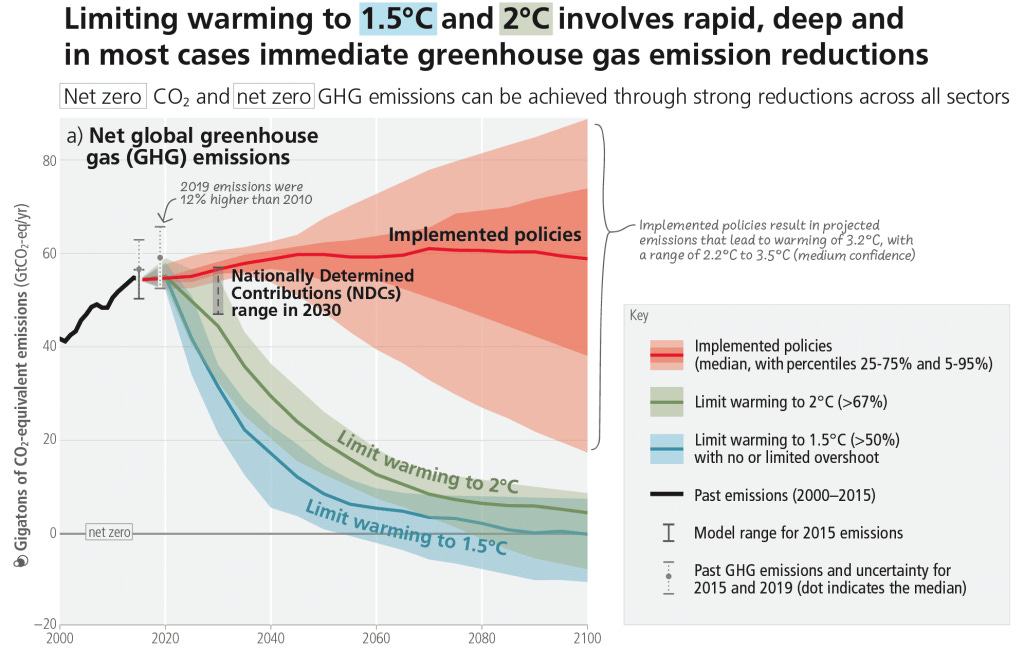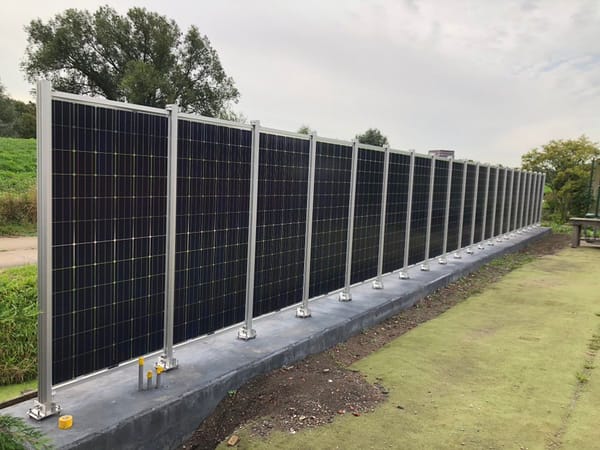Why we’re talking about abatement instead of fossil fuel phase out
First in a series of four expected COP28 issues
Good Afternoon!
Today, I’m starting my review of the top four issues the Dubai climate negotiations are expected to take up next month. First, I’ll talk about the idea of carbon emissions “abatement”, and how that’s becoming a substitute for phasing out fossil fuels. Abatement is becoming a handy way of kicking the net zero can down the road, but it also likely means countries will commit to more investment in green tech.
-Mike

The annual staff-level climate negotiations meeting in Bonn had been moving languidly for two weeks, struggling to agree on an agenda for November’s bigger ministerial meeting in Dubai. Then, near the end of the meeting, U.N. Secretary-General Antonio Gutierres issued a statement calling to, “progressively phase [fossil fuels] out, moving to leave oil, gas and coal in the ground where they belong.”
It is unusual for the Secretary-General to take a specific policy position, and it was a slap in the face of COP28 President Sultan Al Jaber, who is also president of the UAE’s national oil company. Al Jaber had just issued a COP28 agenda plan to address a “phase out of fossil fuel emissions”.
The conflict electrified the Bonn meeting and starkly illustrated how the addition of one word, in this case “emissions” can radically alter the direction of climate negotiations – and potentially the world.
What is happening?
There is a Zen koan which asks, “Would you rather be a rock, or the water that flows around it?” The nature of the rock is to be immovable, blocking anything else from forward movement. Water is unable to stop anything, yet it constantly moves, seeking a path around any obstacle.
Meant to be a Buddist life instruction, the koan is also a useful negotiating tactic. In this case, eliminating fossil fuel emissions has become a regular demand of climate advocates, an unmovable requirement on the path to net zero. So, fossil fuel producers, rather than obstruct their demand, are moving to support it – get rid of the emissions, but keep the fossil fuel. You can keep using fossil fuels as much as you want, so long as the world just captures as much emissions as it produces, and then plows those emissions into the ground. It’s a solution that works well for oil and gas companies, since putting CO2 in the ground is a great way to repurpose expired oil wells that otherwise have no value.
Pivoting towards Secretary-General Gutierres’ demand for a phase out of fossil fuels, this week COP28 President Sultan Al Jaber appropriated Gutierres’ language in an agenda-setting letter that calls for, “a responsible phase down of unabated fossil fuels”. Al Jaber’s new word, “abate” is now a COP28 negotiation keystone, not only for oil-rich Gulf states, but also for the United States, currently the world’s biggest oil producer, which is adopting “emissions abatement” as central tenet of negotiations this year.

What’s the politics?
As with all great struggles, there’s two ways to frame this new negotiation wrinkle. Perspective A acknowledges the world is nowhere close to a path to net zero that ensures we stay below 1.5C of warming because national governments lack the will to clamp down on fossil fuel companies. Perspective B is that economies are too integrated with fossil fuels and the investment cost of switching to green energy is too much to swallow in a short time frame, so we should focus on building up green while continuing to rely on fossil fuels.
Thus, the two perspectives boil down to: How much will is there in each country to address climate change? And, How much private investor interest is there in green energy?
Looking at various national energy programs and climate perspectives, it seems the biggest emitter countries are taking a bit of Perspective A and Perspective B. For example:
- The United States, the world’s biggest oil producer, is emphasizing carbon “abatement”, while launching a giant green energy subsidy, the Inflation Reduction Act.
- The European Union decided to scale back emissions targets, but will push for an “unabated” fossil fuel phase-out.
- China is still rapidly building new coal plants while growing green energy faster than any other country and now emphasizes green investment overseas.
- India is doubling down on new coal plants because they are inexpensive, while planning to negotiate for a faster global phase out of fossil fuels.
Meanwhile, bolstering Perspective B, analysts at McKinsey, Bloomberg, and the iEA have been churning out studies that say to hit next zero any time soon, the world needs to increase annual green energy investment by as much as $6.9 trillion a year. Right now, we’re somewhere around $1.5 trillion annually. Growing that number will require a huge effort – likely including more government subsidies and political commitment – independent of specific efforts to reduce national populations’ love and dependence on fossil fuel use.
Viewed another way, four very different political systems, ranging from totally authoritarian to a progressive liberal confederation, are coming to the same conclusion: Their populations don’t have the interest or will to give up fossil fuels in the near term. They’d rather focus on ramping up a technological solution.

Problems with abatement
While green energy seems to be booming – a study released in Nature this week says we’ve already hit an inflection point where it’s just a matter of time before renewables are much more cost effective than fossil fuels. But abatement relies on three systems that have yet to be worked out: Carbon capture; carbon taxes, which will force economies to pay for abatement; and a carbon emissions trading system, which will enable polluters to buy abatement from anyone around the world.
Right now, all three systems are in their infancy, or flawed. Working carbon capture projects number in the dozens, and proposed projects are moving slowly on their way to scaling up to many thousands of facilities to just get us to net zero. Broad new carbon taxes would require world governments to hold hands together and implement similar systems so industries wouldn’t just move to the lowest enforcement jurisdiction. And a carbon emissions trading system barely exists, while carbon offset verifiers have been revealed to be “likely junk”.
Ultimately, it seems that avoiding fossil fuel phase out is just kicking the can down the road, since there’s no system for abatement anywhere on the horizon, so emissions will continue to go up and warming will get worse, creating more political pressure from suffering populations. A cynical view of the push for abatement is that it is merely an oil company effort to create a new rabbit hole of bureaucracy that could just delay net zero rather than go to the direct solution of just phasing out fossil fuels.
Where’s the money?
The first clear beneficiaries of the abatement push are oil, gas, and coal companies, since their inevitable execution is delayed just a little while longer. For instance, the UAE national oil company plans to spend over $12 billion a year on oil field development, and they’re one of the smaller companies.
But we should also expect the major emitters to double down on green energy investment. Any business connected to green tech as well as minerals needed for green tech should expect rivers of government money to flow their way in the coming year. The major question remaining is how much governments will rely on protectionism to defend their home industries.
As for abatement, major hurdles exist that need to be addressed by the climate negotiators. Governments can subsidize carbon capture, but they’ll be reluctant to enact major carbon taxes. And exactly how carbon trading would work is a thorny issue requiring the creation of an entirely new market with verification, standardization, and so much more. Some globally trusted financial entity with expertise in commodities would have to oversee it, but there’s no clear candidate, as much as the Chicagoan in me says it should simply be managed by the Chicago Mercantile Exchange (which does sell carbon credits, FYI).
Next Tuesday I’ll address developing country climate loss and debt financing, an issue the last COP tried to ignore completely, and is now managing to take over almost every climate conversation.
Other Things Happened
- The National Academy for Science released a 652-page study this week that details over 80 U.S. climate policy recommendations. Many recommendations from a 2021 study were included as part of the Inflation Reduction Act.
- El Niño is expected to last into mid-2024, meaning more rainfall in the Northern climes, and more heat in the South.
- Pope Francis is considering going to COP28 in Dubai, a first for a pontiff.
Whew! You reached the bottom! Have you watched the Laser Cats sketch? Because today would be a good day to do it.





